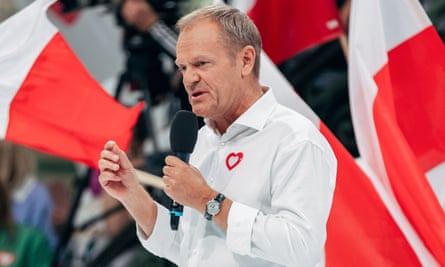Far-right coalition tipped as kingmaker in Polish election | Poland

The big political battle in Sunday’s Polish parliamentary election may be between the ruling Law and Justice (PiS) party, seeking a third term in office, and the opposition Civic Platform (PO) led by Donald Tusk, the former prime minister and European Council president.
But with polls suggesting that neither side will have the votes to form a government outright, the decisive say in who rules Poland for the next four years could lie with Confederation, an eclectic far-right coalition of nationalists, libertarians and monarchists.
As Poland enters the final days of campaigning, Confederation is polling at about 10%, which could give it enough MPs to hold the balance of power.
“If there is a hung parliament, they will be the kingmakers,” said Aleks Szczerbiak, politics professor at the University of Sussex, UK.
Confederation is a three-way marriage of convenience between groupings that share a radical rightwing orientation but vary considerably in their political and economic outlook. It has campaigned on a programme of low taxes, rejection of migration to Poland, and on reducing support for Ukraine and Ukrainian refugees.
Confederation is unlikely to enter a formal governing coalition, as this would damage its self-styled anti-establishment credentials. But analysts suggest that if PiS needs just a handful of MPs to form a government, it may seek to woo parts of Confederation, or persuade the party to prop up a minority government.
Krzysztof Bosak, one of the rightwing Confederation party’s leaders, addressing a rally in Warsaw on 7 October. Photograph: Paweł Supernak/EPA
Another scenario could be Confederation entering a governing pact with an opposition minority government and agreeing to pass its budget, enabling it to govern for at least a year. This could be in exchange for concessions: public appointments, constitutionally valuable parliamentary positions and a presence in public broadcasting and would be deeply controversial among many supporters of Tusk and other leftwing and liberal opposition parties.
Confederation has a history of brazen antisemitism and homophobia. During the last election campaign, in 2019, Sławomir Mentzen, one of the party’s leaders, summarised Confederation’s priorities: “We don’t want Jews, homosexuals, abortions, taxes, or the European Union.” His comment was picked up by the media and nicknamed “Mentzen’s five points”. In the election seven months later, Confederation barely scraped past the electoral threshold, with 6.4% of votes.
Today, Mentzen disavows the comment. The 36-year-old self-styled entrepreneur is now the TikTok-famous face of the party, and only taxes and abortion seem to remain from the original agenda. The party has released its new “five points”, including “simple and low taxes” and “zero social benefits for Ukrainians”.
A study of this year’s first-time voters showed that more than a third were planning to vote for Confederation, including 46% of men and 16% of women.
 A supporter cheers the PiS while watching an election debate in Warsaw on Monday. Photograph: Jaap Arriens/NurPhoto/Shutterstock
A supporter cheers the PiS while watching an election debate in Warsaw on Monday. Photograph: Jaap Arriens/NurPhoto/Shutterstock
On Monday, Confederation’s Krzysztof Bosak represented the party in a pre-election debate on public television, and pressed hard on anti-Ukraine and anti-migration talking points. “The border must be protected, we cannot succumb to any political correctness here. Every piece of Polish territory must be defended,” he said.
The threat of Confederation scooping up anti-Ukraine votes has led PiS to take a firmer line on its neighbour recently, with the prime minister, Mateusz Morawiecki, causing waves when he announced a halt in Polish arms transfers to Kyiv.
skip past newsletter promotion
Sign up to Headlines Europe
A digest of the morning’s main headlines from the Europe edition emailed direct to you every week day
„,”newsletterId”:”headlines-europe”,”successDescription”:”A digest of the morning’s main headlines from the Europe edition emailed direct to you every week day”}” config=”{„renderingTarget”:”Web”}”>Privacy Notice: Newsletters may contain info about charities, online ads, and content funded by outside parties. For more information see our Privacy Policy. We use Google reCaptcha to protect our website and the Google Privacy Policy and Terms of Service apply.
after newsletter promotion
Because of the different brands of radicals and extremists under Confederation’s broad tent, the party draws support from different social groups: young voters who feel alienated from the mainstream political process, and people with extreme anti-abortion views who feel PiS has not gone far enough in reducing reproductive rights.
 Donald Tusk addressing supporters in Łódź on Tuesday. Photograph: Artur Marcinkowski/Fotonews/Newspix/Zuma Press/Shutterstock
Donald Tusk addressing supporters in Łódź on Tuesday. Photograph: Artur Marcinkowski/Fotonews/Newspix/Zuma Press/Shutterstock
In south-east Poland’s Subcarpathia, where many of the disproportionately poor and ageing residents are not libertarians, there is considerable support for the monarchist Grzegorz Braun, a conspiracy theorist who has a hard line on abortion and is vocally antisemitic, who won a seat on Confederation’s ticket in the last election.
Other candidates are libertarians. The Warsaw businessman Michał Połuboczek, also standing for Confederation in the region, said his programme was about low taxes, small government, and self-sufficient villages generating their energy through renewable sources. Połuboczek said he was interested in “the economy, not worldviews”, adding: “The state should not furnish someone’s house.”
With the different wings of Confederation often unable to agree, their presence as part of a governing coalition, whether formally or informally, would be a wild card in Polish politics.
“If they do enter a pact, Confederation would not be very loyal … They will engage in guerrilla warfare and hope to capitalise on chaos,” said Szczerbiak.





